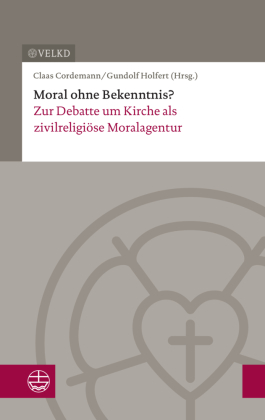Moral ohne Bekenntnis? - Zur Debatte um Kirche als zivilreligiöse Moralagentur. Dokumentation der XVII. Konsultation Kirchenleitung und wissenschaftliche Theologie
| Verlag | Evangelische Verlagsanstalt |
| Auflage | 2017 |
| Seiten | 128 |
| Format | 12,4 x 19,0 x 1,0 cm |
| Gewicht | 148 g |
| ISBN-10 | 3374051588 |
| ISBN-13 | 9783374051588 |
| Bestell-Nr | 37405158A |
Im gesellschaftlichen Diskurs und in der medialen Wahrnehmung kommen Kirche und Theologie vornehmlich dann vor, wenn es um die moralischen Grundlagen des Zusammenlebens geht. Sie melden sich in öffentlichen Stellungnahmen, durch Sozialworte oder mit Denkschriften zu Wort. Aktuelle Beispiele sind die Debatten um die Flüchtlingskrise, die Sterbehilfe, die Sexualethik, den Klimawandel, den Finanzkapitalismus. Gegenüber dieser Tendenz sollten Kirche und Theologie weniger Verhaltensnormierungen anstreben als vielmehr die Fähigkeit zur eigenen Urteilsbildung in ethischen Fragen stärken. Es ist ein Selbstmissverständnis, wenn die Kirchen sich als Moralagenturen verstehen. Die Beiträge in diesem Band wollen u. a. Antworten auf die Fragen geben: Wie steht der Wahrheitsanspruch des Evangeliums zur Vermittlung von Werten in und für diese Gesellschaft? Sind Kirche und Theologie verführt, den Relevanzverlust des Glaubens in der gesellschaftlichen Öffentlichkeit auf ethischem Gebiet auszugleich en? Laufen sie Gefahr, sich im Kampf um die knappe Ressource Aufmerksamkeit selbst zu säkularisieren und die christliche Botschaft zu nivellieren? Mit Beiträgen von Corinna Dahlgrün, Johannes Fischer, Elisabeth Gräb-Schmidt, Michael Meyer-Blanck, Matthias Kamann, Peter Schallenberg und Notger Slenczka.[Morality without Confession? On the Debate about the Churches as Civil Religious Moral Agencies.Proceedings of the XVII. Consultation Church Leadership and Academic Theology]In social discourse and medial perception church and theology are predominantly present when it comes to the moral foundations of communal life. Regarding these topics they make public statements, publish social papers or memoranda. Recent examples are the debates on the migration crisis, euthanasia, sexual ethics, climate change, and financial capitalism. In view of this trend the churches should give less prominence to behavioural norms and advocate more the individual capacity to form a personal judgement on ethical issues. It is a self-misunderstanding when churches understand themselves as moral agencies.The contributions in this volume want to answer questions like: What is the relationship between the truth claim of the Gospel and the endeavour to convey social values? Is there the temptation for the churches to compensate the loss of relevance of faith in the public space through activities in the field of ethics? Do they run the risk of secularising themselves and levelling the Christian message?
Morality without Confession? - On the Debate about the Churches as Civil Religious Moral Agencies.
Proceedings of the XVII. Consultation Church Leadership and Academic Theology]
In social discourse and medial perception church and theology are predominantly present when it comes to the moral foundations of communal life. Regarding these topics they make public statements, publish social papers or memoranda. Recent examples are the debates on the migration crisis, euthanasia, sexual ethics, climate change, and financial capitalism. In view of this trend the churches should give less prominence to behavioural norms and advocate more the individual capacity to form a personal judgement on ethical issues. It is a self-misunderstanding when churches understand themselves as moral agencies.
The contributions in this volume want to answer questions like: What is the relationship between the truth claim of the Gospel and the endeavour to convey social values? Is there the temptat ion for the churches to compensate the loss of relevance of faith in the public space through activities in the field of ethics? Do they run the risk of secularising themselves and levelling the Christian message?

